Like Covid, but with Missiles
My experience while "stuck" in Israel during Operation Rising Lion.
Hi friends,
After three weeks in Israel, I am finally home safe and sound. Thank you to everyone who checked in on me from afar—I didn’t expect it, and it gave me comfort.
I originally went to Israel for my boyfriend’s nephew’s bar mitzvah and arrived a week before him to volunteer with Sar-El, a program that places volunteers on IDF bases to assist with logistical support. The day he was supposed to fly to Israel to join me was the day the new war with Iran started, so his flight was canceled.
This was not the Drop I imagined writing when I first set off for Israel, but it turned out to be far more meaningful than I could have expected. I’m posting this one first and then will write about my Sar-El experience in a follow-up post. Thank you for reading.
This Drop is dedicated to the 28 Israelis who lost their lives during this war. May their memories be a blessing. 🕯
Chapter 1: A New War
After the announcement of Israel’s attack on Iranian nuclear sites, the entire country shut down. All public gatherings were canceled, so I spent Shabbos dinner with a couple I knew from my MJE community who moved to Tel Aviv, and that’s where I had my first siren experience.
Because they’re such a calm couple, I felt I was in good hands. They had a very nice mamad (a shelter in one’s home) that doubly served as their three-year-old daughter’s bedroom. As we heard short pops overhead, one of my friends pointed to the sky with a grin on his face, nodding his head in affirmation. “Iron Dome” he mouthed (we had to keep quiet since his daughters were sleeping). That was when I realized I was hearing the Iron Dome, Israel’s defense system, for the first time.
Short pops of defense burst to meet enemy rockets, followed by one large bang. “That didn’t sound good,” my friend whispered as his grin quickly disappeared. He explained the difference in missile sounds and how to distinguish between the pops of Iron Dome rockets and heavier impact of rockets hitting the ground.
When we got the okay to leave the shelter, I walked the one-minute walk to my Airbnb. I was alone that night since my boyfriend couldn’t fly in.
At about 1am, I was holding my phone in my hands (Shabbos, I know, but I kept it on due to siren alerts), when the ominous duh-dun duh-dun of the Home Front Command app went off, signaling me to stay close to a shelter and causing my heart to nearly burst out of my chest.
Then, the real sirens went off in central Tel Aviv, alerting residents of an incoming missile barrage. I jumped out of bed, grabbed my water bottle and keys, put on my flip flops, and headed down to my apartment building’s miklat (a public shelter usually in the basement of a building), which was a much different vibe than my friends’ shelter down the street.
Instead of a child’s clean, decorated bedroom, this miklat doubled as a storage room and was full of strangers. I sat in a corner chair as people filed in: old ladies holding babies close to their chests, young couples, and a single guy with a dog. They talked among themselves in Hebrew and I felt left out.
Suddenly, four thunderous booms rang out one after the other. It felt like it was happening right outside our room. I will never forget the look a young man gave me in that tense moment. He was a man about my age, sitting alone like I was. When his eyes locked with mine, strained with uncertainty, I could hear his silent questions directed to me: Are you as scared as I am? Are we going to be okay?
Not used to rocket fire, my body started uncontrollably shaking and the tears started falling. Thankfully, an Israeli woman about my age said to me, “Ze beseder, ze beseder.” I may not be fluent in Hebrew (yet), but I knew what that meant: it’s okay.
About 10 minutes later, we were given the all-clear to leave the shelter, and I headed upstairs to my room. I was too afraid to fall asleep, dreading the possibility of that scary alarm waking me up (as I dread every alarm waking me up, but worse), so I made the mistake of reading the news and watching footage from what was the largest missile barrage in world history. I couldn’t believe I just sat through that. Thank G-d (and Danny Gold) for the Iron Dome!
Chapter 2: From Margaritas to Missiles
That was a glimpse of what my nights in Tel Aviv were like for a week. Luckily, my Sar-El friends were staying at a nearby hotel called the Maxim which gives discounts to volunteers. My friends (shoutout to Jill and Judi!) graciously let me crash on their floor so I wasn’t alone. Not only was I surrounded by love and good company daily, but I got free breakfast, free happy hour, and miklat experiences I will never forget. I already have a book title in mind: Down in the Maxim Hotel.
Seriously, I could write a book about all the characters I met down there! There was Brad, an older gentleman from San Antionio, TX with a thick accent and Texan pride. He carried around copies of a photo of John C. Woods, aka “the Texas Hangman,” the Nuremberg executioner of Nazis. How can you be afraid of Iranian missiles when you have the spirit of John C. Woods in your back pocket?
There was Sandra, a playwright from Connecticut who I bonded with, not just because she’s a fellow Nutmegger, but because she’s left-leaning like me. We both shared our sadness and disappointment when we heard that some Jews in Israel praised the deaths of an Arab family in the village of Tamra due to the missiles. Sandra wrote a play about both Jews and Palestinians after October 7th, and she’s writing a new play about what we all just experienced at this hotel. I hope I make it into her play!
Todd, visiting his daughter who just moved here, grew up Conservative and had become more religious. We had good chats about spirituality over Arak on the rooftop.
Speaking of the rooftop, I wrote on social media that the day-to-day juxtaposition was wild. One minute we would be sitting up there, enjoying takeout of tacos and bottled margaritas from the one restaurant that was open, overlooking a Mediterranean sunset while practicing our Hebrew and laughing…
… the next minute, alarms would send us rushing to the basement shelter, huddling together while we heard nearby booms, a mix of the Iron Dome intercepting missiles mixed with real ones that struck the city.
The scariest one was the night a missile landed near the U.S. Embassy. It actually landed just four blocks from our hotel. The sound was so loud, it reverberated in my ear. My friend clasped onto my hand so tightly as we all screamed.
The next day, we walked around, surveying the damage. I’ll never forget that day. There was so much glass from the impact, it looked like Kristallnacht 2.0.
I met an oleh (an immigrant to Israel) who told me his whole apartment was “ripped to shreds.” I also met a shopkeeper who gave me a free beer because his liquor store was in ruins, and frankly, I could have used the beer.

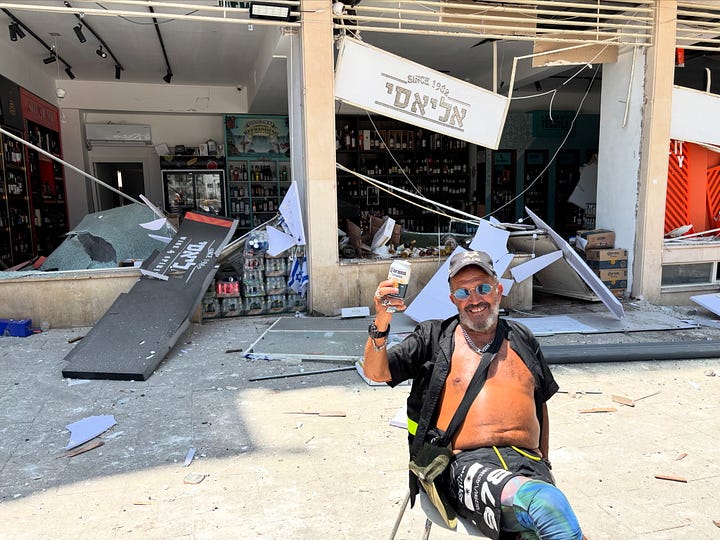
One Israeli also taking in the damage to his neighborhood told me, “We put things to the side and continue forward. That’s the chemistry of the Middle East.”
Dumbfounded by the destruction before me—I had never seen anything like it in my life—I was surprised to hear a light-hearted, “Hey, Miranda!” coming from the sidewalk. It was some friends from the hotel sitting at a table at the one juice shop that was open. Suddenly, I felt the tension in my shoulders release as I saw my friends. What else was there to do besides have some juice?
This became our reality. With most of the country shut down, it felt like Covid, but with missiles.
At one point on the beach, I had a realization that this was a strange time for Israelis too. I saw a soldier come out of a taxi cab with a professional camera. He looked around in quiet amazement at the nearly empty Tel Aviv beach, one that’s normally buzzing with people and life.
As I saw him snapping photos, I was reminded of how I was in awe of the soldiers on my first trip to Israel on Birthright, 13 years ago. Now, this young soldier stood in awe. In that moment, we were both in awe together, marveling at the strangeness of reality.
Two stories to end this chapter on a positive note:
I was able to find a volunteer opportunity through a local WhatsApp group (which was mentioned in the news here!). A few Tel Avivians had organized an impromptu day camp for young children, giving other parents a much-needed break. Together, we played games and made arts and crafts with the kids, and the parents were so grateful. It made me wonder what children make of this situation and how they’re coping. It was inspiring watching a community come together during an unprecedented time to bring joy to one another.
As soon as that first Shabbat during the war ended, we did Havdalah (blessings to separate Shabbat from the rest of the week) on the rooftop of the Maxim Hotel. It was cathartic to sing and sway together in the face of our enemies. After it ended, a man came up to us and said how beautiful the service was. He’s not Jewish, from the country of Georgia, and was here for work and was stuck. He said that our Jewish blessings were truly inspiring to see.
Chapter 3: Living on a Prayer
After a week spent relaxing on the beach by day (even though beaches were technically closed) and running to bomb shelters about three times per night, I headed to my boyfriend’s family in Ariel for his nephew’s bar mitzvah. Luckily, it happened on the one day when restrictions eased, so small public gatherings were permitted!
It was so nice getting to experience a simcha during times of war. This is what Israel is all about: pausing to celebrate life in the middle of chaos. I even got a big piece of shrapnel that fell a few days prior to take home as a souvenir!
What I took away from my time in Ariel, though, was something much more meaningful: family, quality time, and prayer. Bomb shelters are so much better when you play Telephone with cute children in them!
I also felt like my spirituality was awakened during this part of my trip, especially when I realized that the parsha during the war with Iran was Shelach, when Moses sends spies to scout the land of Israel.
Something stirred within my Jewish soul as I heard the Torah being read: “The land, which we passed through to spy it out, is an exceedingly good land. If the Lord delights in us, he will bring us into this land and give it to us, a land that flows with milk and honey” (Numbers 14:7).
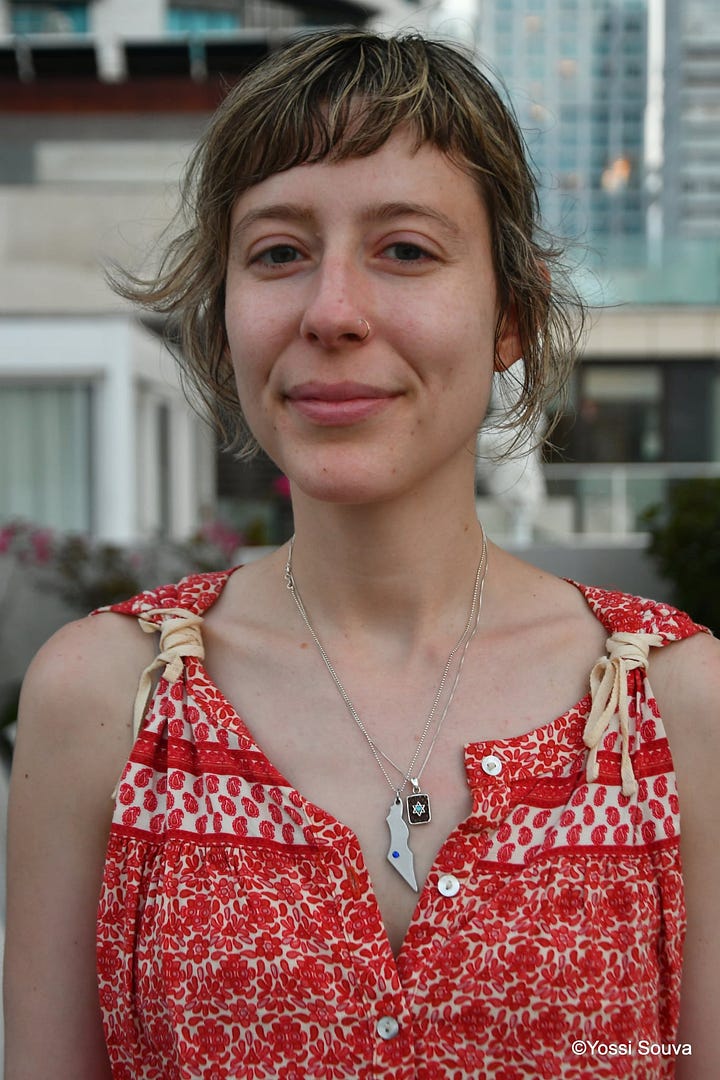
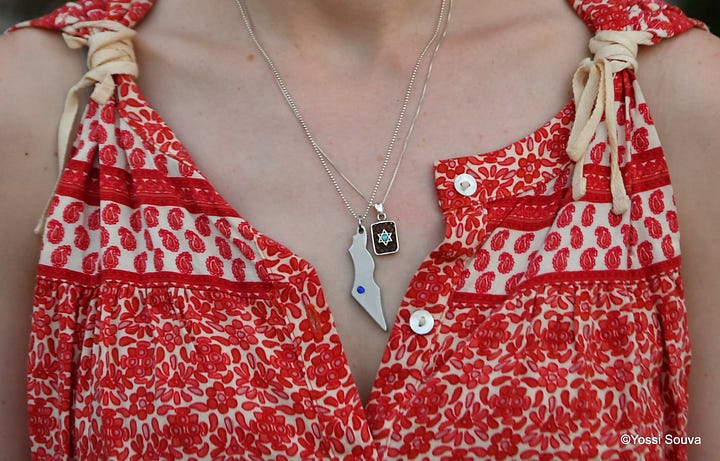
I had been to Israel six times before—for work, with organized group trips, to visit family—but this was the first time I found myself contemplating my purpose for being in that exceedingly good land during this time. (Side note: a few days later, when reading The Source by James Michener, the book also quoted this parsha!).
I got chills all over again when I realized that the following Shabbat would be Parshat Korach, my bat mitzvah portion.
As for prayer, I davened in the morning with the family. Not a stranger to prayer but one who hasn’t prayed in a minute, I opened up a prayer book and was taken by the words on the page I happened to flip to.
It was the Kabbalat Ol Malchut Shamayim, or the "Accepting the Sovereignty of Heaven” prayer from Shacharit (the morning prayers). I had never noticed this prayer before. The words read:
What are we? What is our life? What are our acts of kindness? What is our righteousness? What is our deliverance? What is our strength? What is our might?
These powerful questions were reminiscent of the questions I was asking myself on this trip. The prayer is about thanking and praising G-d. Considering I was safe and able to celebrate a simcha, I had a lot to thank G-d for.
I now say that prayer each morning, my own daily reminder of my time in Israel during the war. My soul lifts at these words:
Happy are we! How goodly is our portion, and how pleasant is our lot, and how beautiful our heritage!
Chapter 4: A Taste of Kibbutz Life
While in Israel, I learned of an opportunity to fulfill a childhood dream of mine. Sar-El invited volunteers stuck in Israel to spend a week on a kibbutz in the south to learning Hebrew, on a program called Kibbutzimer. I remember learning about kibbutzim, agricultural communities in Israel, in Hebrew school as a child and thinking the idea was neat. I really wanted to live on one.
I told Sar-El I would sign up for the program as long as I could work remotely in the evenings. I still had a job after all, and didn’t bring my laptop on my trip because I didn’t think I’d stay an extra week and a half! So, thanks to WhatsApp and the kindness of strangers, I procured a laptop and was ready to head to the south.
My way of getting there was quite scary, though. I was standing outside the train station in Tel Aviv, looking for the group when of course, a siren went off. I was caught off guard because it was at 8am, an odd time for Iran to send missiles!
I followed strangers into an office building, and we waited around in the stairwell. This was probably the most anxious I had been trip, since I know stairwells are more of a back-up option to shelters. But the strangers calmed me down and assured me it was safe. I was so scared I didn’t tell my mom about this moment (hey, Mom!).
Our small group of seven arrived at Mashabei Sadeh, a kibbutz so remote that it was much safer than Tel Aviv. In fact, some families from Tel Aviv were “vacationing” there to get away from the sirens.
Ironically, even though I felt safer, I was pretty sad on this kibbutz because I missed some of my Sar-El friends who left through Egypt. It’s strange to miss a time when you were in danger, but that goes to show how impactful bonding is.
Every morning, we studied Hebrew for three hours. I learned important words like milchama (war), and hafsakat eish (ceasefire). And then I worked in the afternoons/evenings.
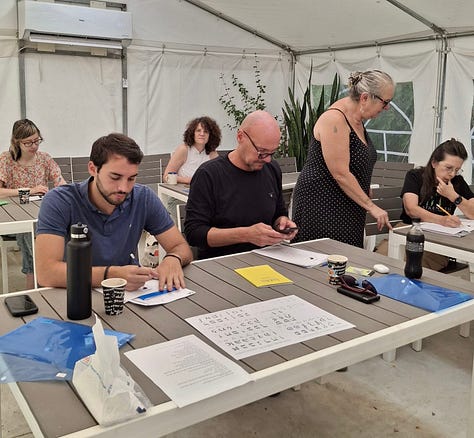

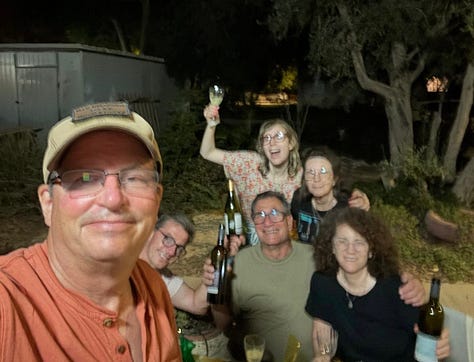
There wasn’t much going on, so we found pleasure in the simple things: walking around, saying hello to the kibbutz cows, and socializing at a small coffee cart.
In the evenings, it became my solo routine to exercise on those funny workout playgrounds they have all over Israel. I enjoyed “running” on the step-and-swing machine and staring up at the stars, while listening to the sounds of peacocks wailing and Israeli Air Force jets fly overhead from a nearby base. It was a reminder of how important it is to have routine while going through a challenging time.
Even though the kibbutz was safer than the city, we still had our share of sirens. I’ll never forget how I learned the Hebrew word for airplane. At around 7am, we were woken up by the Home Front Command alarm warning us to stay near a shelter. As we gathered outside, we heard a loud roaring sound that was quickly grew louder. Suddenly, the sound was overhead, so I panicked and sprinted across the road to the shelter. That’s when I heard Israelis calling out, “Matos! Matos!” They quickly reassured me that it wasn’t a rocket, just a plane from the nearby air force base. Phew!
About halfway through our kibbutz stay, a ceasefire was put in place between Israel and Iran. But that didn’t make life in Israel peaches and cream. That morning, seven soldiers died in Gaza. During this new war, I had forgotten all about the ongoing war with Hamas, and felt so guilty.
I want to share something our Hebrew teacher told us that somber morning:
“This is everyday Israeli life: a ceasefire is put in place and the country opens up, but then seven soldiers die. We live day to day, yes, but that doesn’t mean you should make your problems small. Everyone has their own problems they’re dealing with. I ask that you think about us Israelis when we’re home. And I want you to know that you coming here gives us power and support.”
Thanks to the ceasefire, we got to go on a field trip! We visited places even Israelis don’t visit because they’re so remote:
Our first stop was Shivta, a former Nabatean city with Byzantine ruins, including churches, homes, and ancient agricultural systems.
We then visited an abandoned train car from the Ottoman Empire. This rusted relic was from the Turkish military railway, a line that ran between Be’er Sheva and the Sinai Peninsula, and was only in use for a couple of years until the end of WWI.
Ashalim Power Station: This thermal energy producer looks like the tower from Mordor. 50,000 mirrors reflect and heat water inside the tower, providing about 1.6% of Israel’s energy.
Along the Egyptian border stand 100 columns. Each one is inscribed with the word for “peace” in another language. In the 90s, Israeli sculptor Dani Karavan created “Path of Peace” in response to the peace agreement between Israel and Egypt and as a symbol of hope for lasting peace in the region.
Ezuz, where Dani Karavan was from, is a tiny, off-the-grid desert village where a few families settled years ago and never left, kind of like a funky artist colony. I got Torah-chills again when one resident told us this was as close as you can get to where Moses sent out the spies to scout the land. I knew I felt a connection to Ezuz, and it only grew. There are a few hotels there, one of which is made from a repurposed bus. It’s soooo cute and I would love to stay there sometime to escape. Next war!
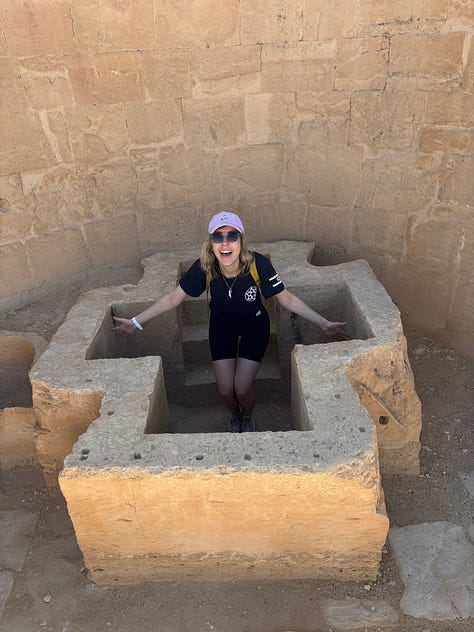
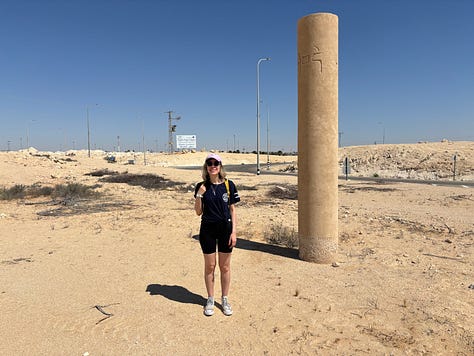
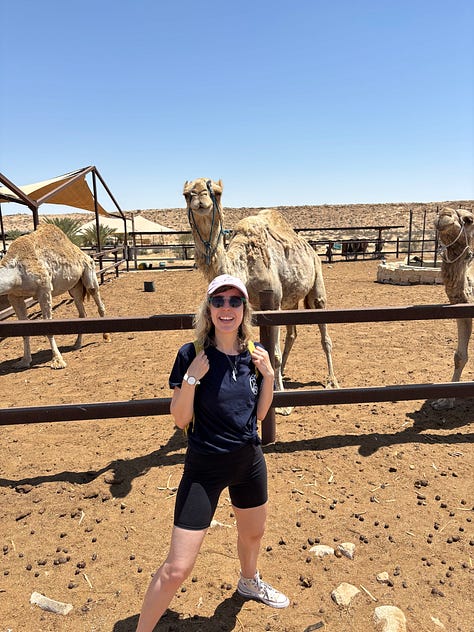
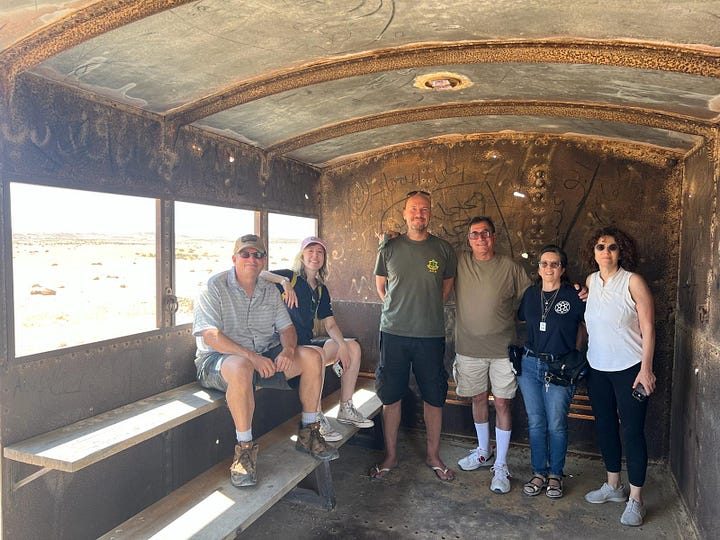
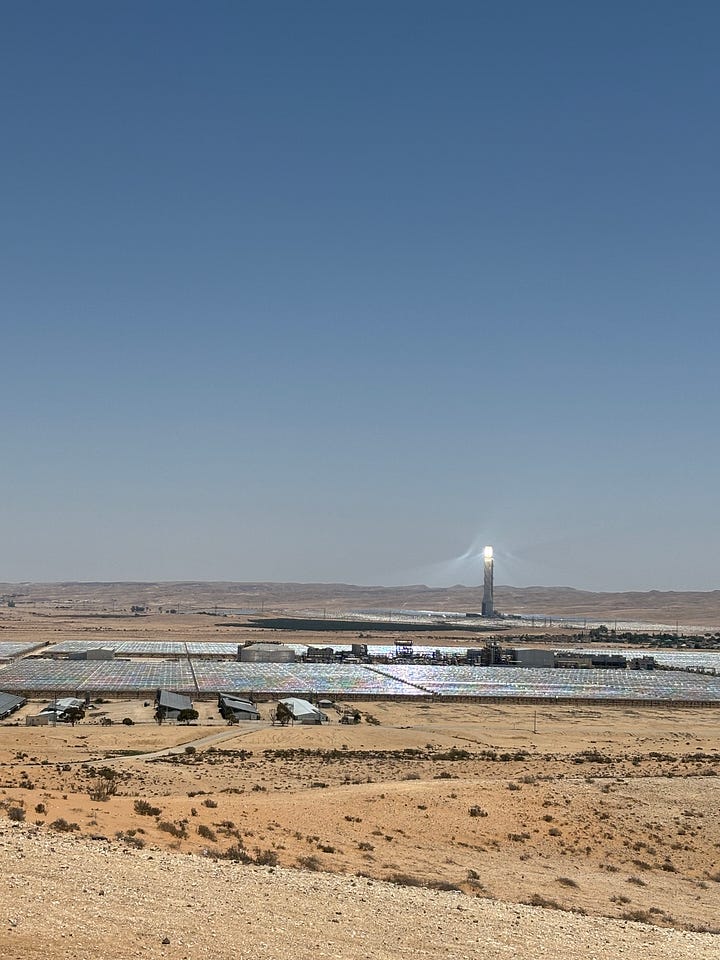
By the time I was finally settling into my routine, it was time to head back to Tel Aviv. It felt weird living out a childhood dream of mine and experiencing kibbutz life under these circumstances. It made me realize I don’t think I’m cut out for the quiet kibbutz life; I’m more of a big city gal! But I recommend this short-term Ulpan for anyone looking to strengthen their Hebrew in an immersive way.
Chapter 5: Back in Tel Aviv
Back in the city, I secured an affordable flight out of Israel with a layover in Bucharest. I was invited over for Shabbat dinner by some neighbors I met my AirBnb’s miklat. They were a lovely French couple who immigrated to Israel years ago.
I had never experienced a Shabbat meal so lively and full of joy! Ten people about my age sat around the dinner table, singing with wild abandon, fists pounding on the table, Arak and wine flowing. They all looked so Israeli-casual: t-shirts and shorts, kippot, and proudly respecting tradition. It was inspiring to see.
I later learned they were all Tunisian-French Israelis, and that’s why they were so spirited. I finally understood Sephardi supremacy. As much as I love my matzo ball soup, my Shabbat meals aren’t like this!
On Sunday, June 29, I had my bags packed and was about to leave for the airport, when I received an email from my airline. My flight was canceled.
After some stress and rebooking, I pivoted and spent my last day having thoughtful conversations with people I either barely knew or just met.
First up was lunch (at the best shawarma place in TLV!) with someone from my DC Jewish life. He had moved here a year ago with his family and saw on Facebook that I was still in town. We talked about how his past year has been (pretty eventful), and he shared some words for American Jews:
“Jews need to come here, spend time here, and live here. They need to see history unfolding in real time, only in the best ways. We need more Americans here. It’s our time to come and shape this country, put our footprint on it, to make sure Israel and America can get back on track together. American Jews are uniquely positioned to do that in a way that Jews in other countries aren’t. And Jewish Americans need Israel. There’s this emerging symbiotic need. In a country that’s always 10 years behind, it needs Western energy. Come! Let’s build together.”
I then got drinks at a trendy bar with a woman around my age who made Aliyah from Colorado six months ago. I met her at the hotel during the war because her parents were staying there.
She told me that she moved for a couple of reasons, one of which was October 7th and the reactions from colleagues and so-called friends. She said that moving here keeps her from spiraling and worrying about antisemitism.
By the end of the day I couldn’t help but think… maybe my flight was canceled so I could stay one more day to have these conversations. 👀
Conclusion: The End of a Journey
The next day, I made it out of Israel through Athens. My boyfriend’s parents had a layover there, too, so we split our time between the rooftop pool and Chabad. I saw the Acropolis, the Parthenon, and a really great thrift store, but nothing compared to what I experienced in Israel.
I left a piece of myself in Israel on this trip, in part for the people I met and bonded with in bomb shelters at 3am, but also for my love of the country. I’ve always known I had it, but this time I truly felt it in my soul and in the way I cried so much when I had to finally leave.
Before I left for Israel three and a half weeks prior, someone told me that every trip there changes you in some way. I feel forever altered by my most recent experience—by new friends I bonded with in bomb shelters at 3am. By the kindness and strength of strangers. By prayer. By having witnessed a war firsthand, shaping my politics and worldview more acutely. By my love of the country. I’ve always known I had it, but this time I felt it in my soul and in the way I cried so much when I had to finally leave.
I don’t believe I was stuck in Israel. Israelis kept asking me that. “So, you’re stuck here?” I think I was supposed to be there during this time, as crazy as that sounds.
On the way to the airport, my Uber driver asked me, “Heading back to the United States?” I said yep, to which he said, “Big trip.” Buddy, you have no idea.
Am Yisrael Chai. Shabbat Shalom, and as always, thank you for reading. 🦁



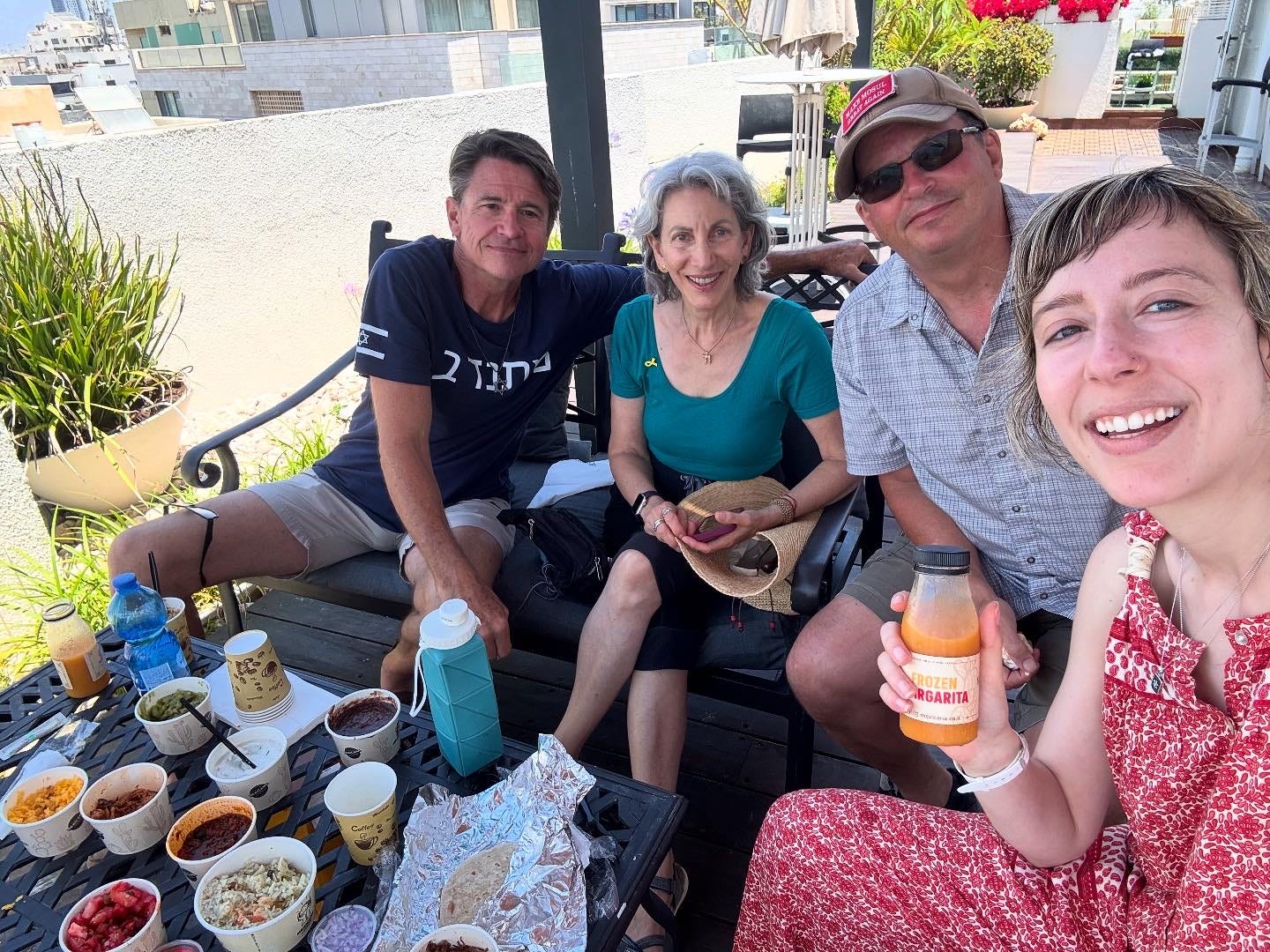

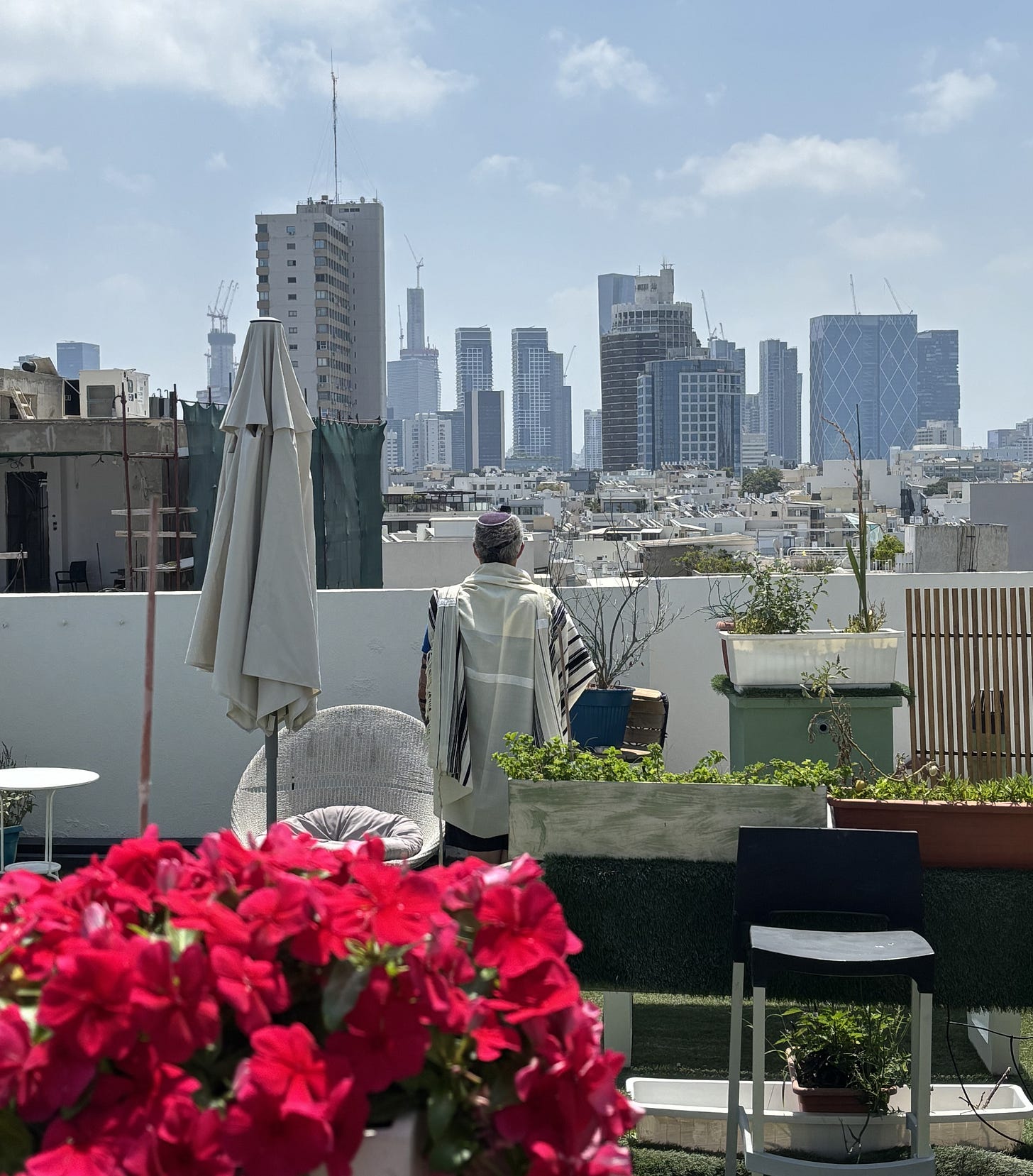


What comprehensive narrative about your joys and fears being in Israel for a Smicha, volunteering, and suddenly finding yourself literally in the middle of a war. You always deliver. So glad we part of your spiritual experience of parsha Shlach and all the rewarding experiences,
people and places you encountered while in Israel. Soon it’s Shabbas. Time to relax
😊🇮🇱💕
It took me awhile to digest this post. Oy!!! Thank you for being there, for sharing your amazing experiences, and for being you! And I especially want to thank your parents for raising you!
✡️ 🫶🏼 🇮🇱